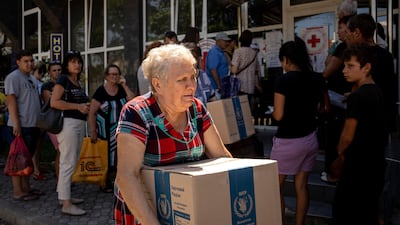The United Nations is facing a record shortfall in funding for its humanitarian programmes, with donations outstripped by rapidly increasing needs driven mainly by conflict and climate change.
The UN's Office for the Co-ordination of Humanitarian Affairs (Ocha) said on Friday that appeals for aid efforts worldwide now added up to $48.7 billion, but only $15bn had been received.
At the same time, humanitarian workers are facing increasingly dangerous environments as they try to deliver aid.
“Global needs are at an all-time high, with a record 303 million people in crisis worldwide,” said Ocha spokesman Jens Laerke in Geneva.
“UN appeals aim to reach 204 million of the most vulnerable.”
According to Ocha's website, the US is the leading donor, contributing about $8bn, while the World Food Programme was the largest recipient.
Mr Laerke said the more than $33bn shortfall was “the largest gap we've ever had”.
“However, it is also the largest amount of donor funding that has ever been committed.
“So the problem is the following: that the needs in the world are rising much, much faster than the donor funding is coming in.”
Some programmes are funded at less than 20 per cent.
The nearly $50bn needed includes all of the UN's co-ordinated appeals worldwide, such as the annual humanitarian response plans in countries such as Syria, Yemen and the Democratic Republic of the Congo, as well as flash appeals in Ukraine and regional appeals for refugees in Afghanistan.
“There's an interest for the entire world to address these issues, because many of them, if they are not addressed now, they will create bigger problems in the future,” Mr Laerke said.
Around the world, armed conflict is a “very large driver of needs”, followed by climate change.
“In many cases, we see a combination of both of them,” Mr Laerke said, giving the Horn of Africa as an example.
He said the funding sought by the UN is meant for all of its humanitarian agencies and some NGOs, but does not cover appeals from the International Federation of Red Cross and Red Crescent Societies and the ICRC because they have independent appeal processes.
Next Friday is World Humanitarian Day, which will be marked with a ceremony at the UN headquarters in Geneva.
Ocha spokesman
“Never before have humanitarians been called to respond to this level of need, and they're doing so in evermore dangerous environments,” Mr Laerke said.
According to data from the NGO Humanitarian Outcomes, more than 148 workers were killed in the line of duty last year — the highest number since 2013.
Last year, 203 aid workers were injured and 117 were kidnapped.
The most violent countries for aid workers continue to be South Sudan, followed by Afghanistan and Syria.
So far this year, 168 aid workers have been attacked, resulting in 44 fatalities, according to Humanitarian Outcomes.
With reporting from agencies.








